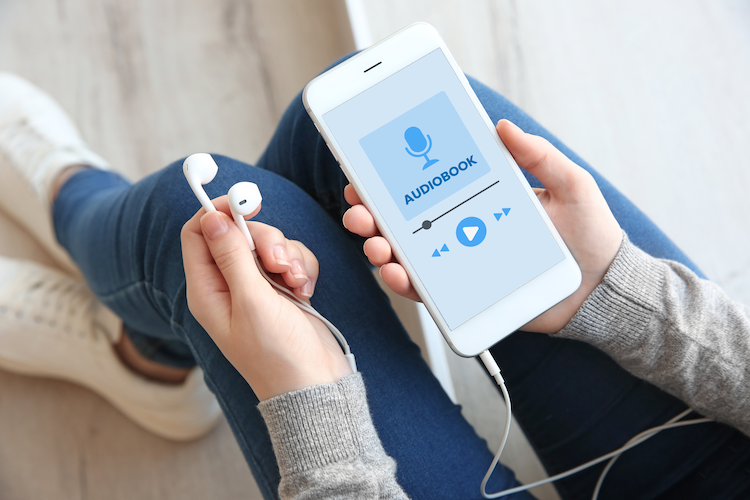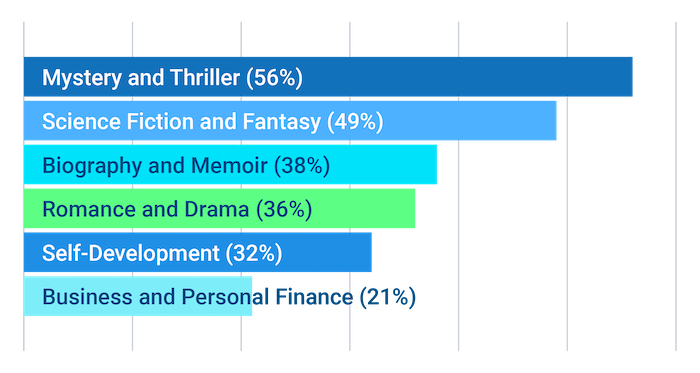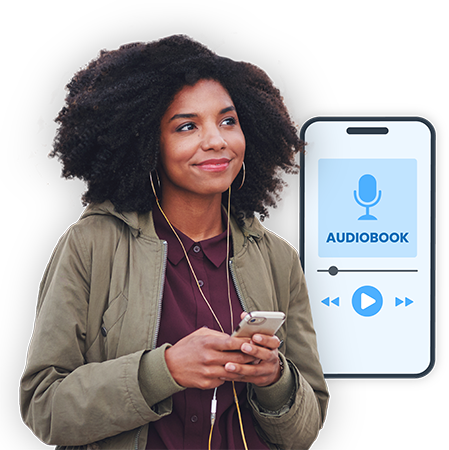In recent years, the audiobook industry has experienced an era of remarkable growth, with audiobook publishers reporting double digit growth in revenue over the past ten years. According to WordsRated, a research organization conducting data-driven analysis on the publishing industry, the audiobook industry will continue to grow, and is expected to be worth about $35.05 billion in 2030.
We surveyed hundreds of American audiobook listeners to gain an understanding of their listening habits and preferences when it comes to audiobooks, and get a sense of what trends we can expect to see in the future.
At a Glance:
- Audiobooks are a fast growing type of audio content
- 67% of listeners say they “read” more with audiobooks
- Narrators can make or break the audiobook experience: nearly 60% of listeners ditched an audiobook because they didn’t enjoy the narrator

Audiobooks are a fast growing type of content:
Half of American audiobook listeners spend 1-4 hours a week listening to audiobooks
In our 2023 Trends Report, we found that ‘audio routines’ have become a mainstay in people’s daily lives. Unlike traditional content, audio-based experiences offer a hands-free and eyes-free experience, allowing individuals to stay entertained or absorb information outside the confines of a screen or paper book.
Audiobooks have consistently been growing their share of the audio landscape. The overall share of time spent listening to audiobooks has increased 106% since 2017.When we asked respondents to rank a number of audio experiences–music, audiobooks, podcasts, AM or FM radio, and the news–in order of personal preference, we found that audiobooks ranked second in terms of overall preference, ranking higher than podcasts and coming second after music.
Our survey found that half of audiobook listeners (50%) spend between 1-4 hours per week listening to audiobooks and one-third (33%) spend 5-10 hours a week listening to audiobooks. When asked in which scenarios they’re most likely to hit play on an audiobook, commute or travel was the most popular choice, with 63% saying they listen to audiobooks while on the go.
It comes as no surprise that audiobook listeners are avid fans of the audio medium overall. According to the Audio Publishers Association, individuals who listen to audiobooks daily spend at least 2 hours more per day engaging with audio content compared to the general public.

Other findings on listening habits include:
- Listeners said they listen to audiobooks during a commute (63%), while completing household chores (54%) and while relaxing, such as when taking a bath or falling asleep (44%).
- When asked how listeners land on their next book, half said they seek out specific titles, while the other half said they are more likely to browse for new titles.
- Women are more likely to browse for new titles than men: 58% of women said they’re likely to browse titles while 42% of men prefer to browse. 58% of men said they will seek out a specific book.
- Over half of listeners generally prefer to listen to fiction books over non-fiction books (56%).


It’s clear that audiobooks are inching towards taking their place in the limelight, even overtaking podcasts in popularity. One of the driving factors behind its growth is the emergence of digital platforms and specialized streaming services dedicated to this medium. Major players such as Audible, Scribd, Apple Books, Kobo, and more have made downloading or streaming audiobooks much more convenient. After much demand, audiobooks were added to Spotify, furthering their efforts in becoming the all-in-one destination for listening needs.

Press Play: How to Get Started
For those considering making the shift from reading to listening, there are plenty of websites and platforms to get you started. All that’s needed is a device capable of playing audiobooks (your phone or tablet works!), a media application or platform to play them on, internet connection, and a book you’d like to listen to.
Though most of the major audiobook providers operate on a paid subscription model, many platforms, such as Audible or Audiobooks.com, offer free trial periods, letting potential customers access a selection of free audiobooks and explore the platform’s library. These trials are a great way to determine if the audio format of books works well with your needs. For those looking for a more cost-effective alternative, with a bit of research, you’ll also be able to find a selection of free audiobooks online.
Lastly, if you’re not sure of which book to start with, browse the web for inspiration! The major streaming platforms will have bestseller lists ranking the best audiobooks from the past year. When in doubt, you can always choose a book you’ve previously read, and enjoy it in a completely new way.

Keep the pages turning:
67% of listeners say they “read” more with audiobooks
The audiobook format remains the fastest growing format in publishing in the United States. If growth continues at this pace, we expect to see readers gravitate to this format over others, such as the e-book or traditional print books.
67% of audiobook listeners say they “read” more with audiobooks compared to if they were to only read books in traditional text format. When integrated into daily routines, audiobooks serve as a channel for more people to enjoy literature, accommodating those even with the busiest of schedules.
For audiobooks listeners, when asked about preference in book format, audiobooks are on par with traditional reading. When considering a new book to read, one-third of respondents said they generally prefer to listen to the title as an audiobook, another third said they would generally prefer to read, one third said it depends on the book.
When it comes to genres of books, listeners generally tend to enjoy fiction over non-fiction genres. The genres that were most popular for audiobooks are Mystery and Thriller (55%) and Science Fiction and Fantasy (48%). Business and Personal Finance was the least popular genre to listen to, with just over a fifth (21%) of respondents saying they enjoy listening to this genre.

Why the audio format?
Predictably, the listeners said the most popular reason for choosing the audio format is for its convenience and portability. Two thirds of audiobook listeners enjoy the format because it’s convenient for multitasking, allowing them to experience literature while having their hands free to complete other tasks. Just under one third (31%) said they find it easier to stay focused on the content in audio form.
The audiobook format also offers an accessible format for digesting books. It enables a diverse population, including individuals with physical, mental, or neurological limitations that may make traditional reading difficult, to have access to literature. This includes individuals with vision impairments, or those who struggle with extended periods of sitting or holding a book. Moreover, it serves as a valuable resource for individuals with attention span difficulties, allowing them to engage with books despite the challenges of sitting down and maintaining a focus on reading.
In a constantly evolving media landscape, writers looking to publish literature should consider leveraging the audiobook format as a valuable addition to their repertoire. The audio format presents an opportunity to reach a wider range of readers and provide an alternative reading experience that’s inclusive of those who find it difficult to participate in books in the traditional way.

Narrators can make or break the audiobook experience:
Nearly 60% of listeners ditched an audiobook because they didn’t enjoy the narrator
The voice that brings the story to life has the power to elevate the experience, or let it fall flat. When it comes to media and our entertainment, everything needs to be just right, and we won’t settle for mediocre. Just like how a poorly written script can ruin a good podcast, or a movie with a good story can be ruined by poor acting, in a similar vein, a well written book will disappoint with a poor audiobook narrator.
When asked about their thoughts on the story experience, audiobook listeners said:
- Having a high quality narrator is essential to a good audiobook experience (64%).
- The audiobook experience is more immersive than actually reading (30%).
- They stopped listening to an audiobook part way through because they didn’t enjoy the narrator (59%).


One of the benefits of experiencing literature through audio is that it often requires less mental effort to listen to an audiobook than to read. With the addition of audio, a significant aspect of the story is presented to the listener, including the voices of the characters, the tone of the dialogue, and the pronunciation of names. With much of this mental exertion removed from the listener’s responsibilities, there is more capacity to fully immerse themselves in the depicted scenes.
When paired with a skilled narrator, storytelling can come to life in new ways in a completely different way. By transforming written words into captivating audio narratives, authors can engage listeners through the power of voice, infusing their stories with emotion, authenticity, and an immersive storytelling experience that goes beyond what’s on the printed page.
Audiobook listeners on the fence about AI narration
We all know that AI is slowly extending its reach, and the audiobook industry is not immune. Some platforms, such as Apple Books and Google Play Books already offer AI narration, allowing publishers to create digitally narrated books from text-to-speech technology.
But are listeners interested in AI narrated books? Over half of audiobook listeners haven’t listened to an AI narrated book yet (55%), while 21% said they weren’t sure if they had. Only 24% of listeners were sure they had listened to an audiobook narrated by an AI before.
As technology improves, we might see more listeners embrace the AI experience. For the time being, many are skeptical about the quality of narration AI can provide, and still desire the nuances and details that come with human storytelling.
Listeners appear to be split on their openness to AI-narration. 53% of listeners are skeptical about the quality of the AI-narrated experience, while 47% are fairly open or very open:
- 20% said they would not consider listening to an AI narrated audiobook at all.
- 33% said they would consider an AI-narrated book, but would much prefer a human narrator.
- Only a small percentage (13%) said they were very open, and expect an AI-narration to provide a similar listening experience to that of a human narrator.


Final takeaways
Similar to what was discovered in our 2023 Trends Report, the audio quality of the book is essential to keeping a listener engaged, and many of us won’t think twice about ditching a book with subpar quality. As audio routines expand, we can expect the audiobook industry to grow, and might see more publishers and independent authors turn to audio to have their stories told. Lastly, until AI-narration can breathe life into stories in the way that humans can, will continue to approach robot storytellers with caution.
Methodology
The survey was conducted by Momentive for Voices, from May 2, 2023 to May 4, 2023. It consisted of a representative sample of 439 Americans 18 years of age or older. The survey looked at listening habits and preferences of audiobook listeners.
About Voices
Voices is the world’s #1 voice marketplace with over 4 million registered users. Since 2005, the biggest and most beloved brands have entrusted Voices to help them find professionals to bring their projects to life. Voices has worked with major clients including Shopify, Microsoft, The History Channel, The Discovery Channel, Hulu, Cisco, the biggest ad agencies and thousands more small businesses.
